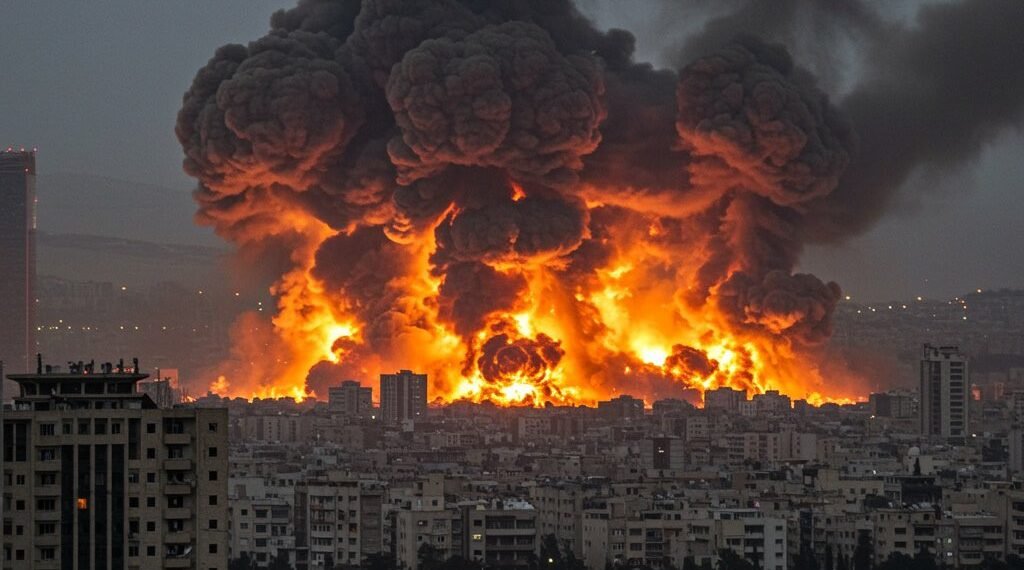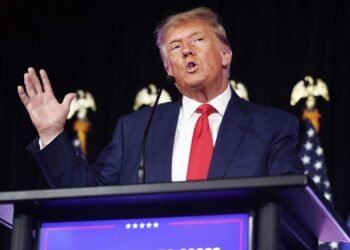Iran’s top nuclear sites—Fordow, Natanz, and Isfahan—were hit in a surprise American air assault. Iran has vowed a “devastating response” as fears of regional war grow.
BY PC Bureau
In a dramatic escalation of the conflict between Israel and Iran, the United States has launched coordinated airstrikes on three of Iran’s most critical nuclear sites—Fordow, Natanz, and Isfahan—marking the first direct American military intervention in the confrontation.
President Donald Trump confirmed the operation early Sunday morning, calling it a “historic success” and a “turning point for global peace.” In a social media post, he stated: “All planes are safely on their way home. Congratulations to our American warriors. Now is the time for peace.”
Massive Firepower Targets Iran’s Deepest Nuclear Site
The most significant strike reportedly hit Fordow, a heavily fortified underground uranium enrichment facility located beneath a mountain near Qom. According to defense sources, six GBU-57 Massive Ordnance Penetrators—30,000-pound “bunker buster” bombs—were dropped by B-2 stealth bombers, the only aircraft capable of carrying them.
Natanz and Isfahan, both home to advanced centrifuge operations and uranium processing facilities, were struck with dozens of Tomahawk cruise missiles launched from naval vessels in the region.
The Pentagon has yet to release an official assessment of damage, but sources suggest the strikes dealt a significant blow to Iran’s nuclear infrastructure.
Iran Reacts: Condemnation, Retaliation, and Warnings
Iran’s Atomic Energy Organization confirmed the attacks, accusing the United States of violating international law and committing an act of aggression against its sovereign territory. Officials in Tehran said legal action would be pursued through international courts and warned that the strikes would not halt the country’s nuclear development.
Supreme Leader Ayatollah Ali Khamenei condemned the attack as a “reckless provocation” and pledged a “painful and proportionate response.” President Masoud Pezeshkian insisted Iran would continue its enrichment program, saying, “Our national dignity will not be buried under American bombs.”
READ: Tribal Body Demands Cancellation of Adani Land Deal in Assam
In the hours following the strikes, Iran reportedly launched retaliatory drone attacks targeting Israeli positions, while allied militias in Yemen threatened renewed assaults on US naval assets in the Red Sea.
— Donald J. Trump (@realDonaldTrump) June 21, 2025
Israel Praises Trump, Highlights Joint Strategy
Israeli Prime Minister Benjamin Netanyahu welcomed the U.S. action, calling it a “bold and necessary move” to prevent Iran from acquiring nuclear weapons. In a televised address, he said, “Tonight, President Trump acted with clarity and courage. This is a moment history will not forget.”
Israeli officials confirmed they had carried out nine consecutive days of airstrikes on Iranian military positions, softening air defenses and clearing the way for American bombers. Foreign Minister Gideon Saar claimed the joint effort had set Iran’s nuclear program back by at least two years.
Diplomatic Channels Collapse
The strikes follow months of backchannel diplomacy between the US, Israel, and Iran, which had seen intermittent progress. Trump had previously urged Netanyahu to delay military action in favor of talks. However, after negotiations stalled, the administration appears to have abandoned diplomacy in favor of a decisive military strike.
Vice President JD Vance defended the shift, stating, “President Trump used force only after all other avenues were exhausted. This was not war—it was prevention.”
Mixed Reactions at Home and Abroad
In Washington, the decision drew both applause and concern. Republican lawmakers largely backed the strikes, with Senator Lindsey Graham praising them as “a masterstroke of leadership.” However, libertarian-leaning voices like Rep. Thomas Massie criticized the lack of Congressional approval, calling it a “clear overreach of executive power.”
READ: As Army Accepts Blame, Manipur Police Exposed Over Crossfire Claim
Even some within Trump’s political base expressed unease, citing his “America First” pledge and past promises to avoid foreign entanglements. Nonetheless, a handful of Democrats, including Senator John Fetterman, voiced support, calling Iran’s nuclear threat “unacceptable.”
Reactions abroad were sharply divided. Saudi Arabia and Egypt condemned the escalation, warning it could destabilize the entire region. European Union officials urged all parties to return to diplomatic channels. The Organisation of Islamic Cooperation announced an emergency summit in Istanbul to address the crisis.
BREAKING: Iranian state media says damage from U.S. strikes at Fordow was limited to just two tunnels — the entrance and exit.
The core remains untouched. 🇮🇷🛡️ pic.twitter.com/CIwZu9XqIU— Sahar Emami (@iamSaharEmami) June 22, 2025
Concerns Over Nuclear Fallout
Experts have warned that attacking active nuclear enrichment sites, particularly Fordow—which was enriching uranium to 60%—could risk environmental contamination. The Arms Control Association denounced the operation, calling it “a dangerous gamble that increases, rather than reduces, the nuclear threat.”
They added that the attack could push Iran toward openly pursuing nuclear weapons, reversing years of partial compliance and international monitoring.
It remains unclear whether this was a one-time strike or the beginning of a sustained military campaign. While Trump declared the mission complete and called for peace, Iran’s vow to retaliate, coupled with regional instability, raises the specter of broader conflict.
As the dust settles and world leaders scramble to prevent further escalation, one question lingers: Has the United States delivered a final warning—or fired the first shot in a larger war?













